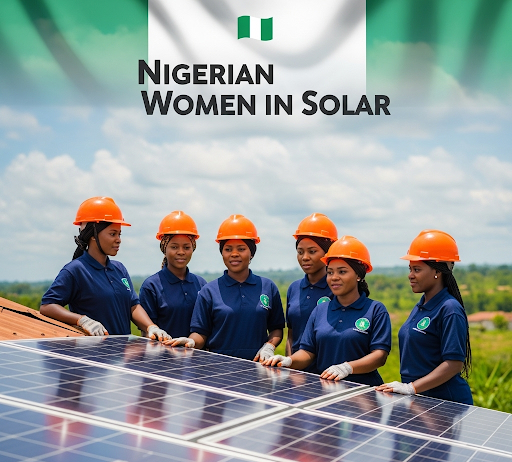During his recent trip to Nigeria, the CEO of Brightaic Green Technologies (Dr. Ben Iheagwara) attended the Nigeria Solar Fair 2025, an event designed to bring together stakeholders from across Nigeria’s growing solar energy industry to showcase cutting-edge solar technologies, discuss bold ideas, learn about smart financing, and share thoughts on how to combat the gender imbalance in the industry.
The event was co-hosted by the Nigeria Solar Marketplace, the Renewable Energy Association of Nigeria (REAN), in strategic collaboration with the Rural Electrification Agency of Nigeria (REA) and the Embassy of the Netherlands on July 10 at the Abuja Continental Hotel.
Prominent in Dr. Iheagwara’s report about the wide-ranging event was the panel discussion on gender imbalance that featured leading women in the industry. He noted that the gender-based panel discussion was especially engaging, enlightening and exhilarating particularly because of the promise the industry holds as a new platform for empowering a new generation of Nigerian women and girls that will help drive transformational innovations and economic development.

As a female engineer trained in both Nigeria and Canada, Dr. Iheagwara’s report on the panel discussion on the gender imbalance in the industry resonated with me. I recalled my days as a young female engineering student being one of the few women in the engineering faculty.
The gender asymmetry in the faculty made me feel like a single melody surrounded by a thunderous chorus of baritones. I felt like a lone female tree lost in a forest of male trees. I imagine that the views the female panelists expressed at the Solar Fair are consistent with the experience of women in the engineering industry in Nigeria.
The engineering industry in Nigeria, particularly the traditional energy sector, has historically been male-dominated. Women comprise only about 22% of engineering and technology graduates, and a mere 8% hold STEM-related positions in the energy sector. This significant gender disparity has indisputably limited Nigeria’s potential for innovation and sustainable development.
However, I believe that the growing number of women in Nigeria’s solar energy industry presents a powerful opportunity for both female empowerment and a new form of economic development, one that is more driven by renewable energy and less by fossil energy. My hopeful outlook on the promise of female empowerment derives from the saying: “when you educate a woman, you educate a village.”

The saying captures the sense of the ripple effect of investing in women’s empowerment. In the context of Nigeria’s solar energy industry, this saying rings particularly true, in that it highlights how training women in this growing industry can trigger a profound transformation of Nigeria’s labour and economic landscape.
The village adage underscores the fact that women often sit at the heart of vital activities in their communities. They command strong social networks and hold enormous social capital that can be used to unleash the untapped potential of the Nigerian human capital. When a woman is trained in solar technology, she doesn’t just apply her skills in isolation, she serves as an agent of positive change within her community.
Women will play a critical role as agents of change via the transformative potential of the solar energy industry, given their considerable role in the use of energy in Nigerian households.
In fact, women control about 60–80% of household energy decisions in Nigeria (cooking, lighting, other household appliances). In other words, women are critical stakeholders in solar energy adoption.
The household energy ecosystem in Nigeria derives majorly from fossil fuels sources: kerosene, liquefied petroleum gas (LPG), gasoline and biomass (firewood, charcoal). These energy sources expose women and their households to a variety of health and environmental hazards.
In this connection, Nigerian women have an interest in promoting solar energy adoption since it will help mitigate indoor air pollution from kerosene and other fossil fuels, reduce risks of accidents (fire hazards), and lead the way to reducing the carbon footprints of households and, in so doing, contribute to Nigeria’s net zero objectives.
The centrality of fossil energy in Nigeria has failed to solve Nigeria’s energy poverty. As a matter of interest, Nigeria faces a triple challenge of overcoming its energy poverty, bridging the gender gap in its workforce, and overcoming the gender stereotypes women face in seeking to enter into the STEM fields. Training women in solar energy-oriented skills will directly address these challenges.
Gender stereotypes remain active barriers to women seeking to join the solar energy industry. When women are increasingly seen in leading technical and entrepreneurial roles within the solar industry, their growing visibility in such roles will fundamentally alter societal perceptions about women’s capabilities.
Women in leading roles in the industry can mentor younger women, share their knowledge and inspire them to pursue similar paths. This peer-to-peer learning is invaluable in areas where formal education in STEM might be limited. Shattering such gender stereotypes can pave the way for greater gender equality across all sectors.
Training women to become major actors in this growing industry will help turbocharge the Nigerian economy. A solar energy industry proportionately staffed by well-skilled women can serve as an incubating system for transforming the complex and inefficient nature of the Nigerian economy, one that comprises a formal and informal sector (which encompasses over 60% of the economy).
While functioning as the main driver of employment and economic activity in Nigeria, the unregulated nature of this sector hinders long-term growth and government effectiveness. The informal sector exposes the Nigerian economy to multiple weaknesses: substantial loss of tax revenue, limited access to credit and financial assistance from traditional banks, lack of social protections like pensions, health insurance, and legal contracts, etc.
Over 65% of Nigerian women work in the informal sector as petty traders, small-scale farmers, and unregistered service providers. Working in this sector prevents millions of Nigerian women from accessing the training, finance, and technology that they need to transform their work into sustainable formal enterprises.
Women-led solar energy businesses can access credit from banks and microfinance institutions. This formal financial inclusion is a crucial step in moving away from the informal economy, where access to capital is limited. By building businesses with records of high earning potential, women can secure larger loans to grow their businesses and invest in their families’ futures.
Including women in the solar energy industry will help reduce the scale of its informal economy while unlocking new avenues for economic growth. This is because women-oriented training programs can equip them with the technical skills for becoming solar technicians, installers, and entrepreneurs.
Armed with the skills of a solar energy worker, women can install solar solutions for her family, her neighbors, and country. When women are trained as solar technicians and entrepreneurs, they acquire skills that can bring them financial empowerment. This financial empowerment can serve as a means for providing good nutrition, improved healthcare, and high-quality education for their children.
Across the world, organizations designed to help reduce gender inequality in the solar industry are springing up. Chief amongst them is the Women in Renewable Energy (WiRE) which was founded in 2013. It has functioned in giving women in North America prominent positions in the industry.
Another is the Solar Sister project. This organization provides many inspiring stories of ordinary women in many parts of Africa who have testified about how the solar industry has helped them gain greater control over their finances. They have trained thousands of women entrepreneurs across Africa and provided clean energy access to millions. The Green Girls Organization in Cameroon trains women to work in various solar energy domains to cultivate new skills and grow the economy.
Women-oriented organizations like the above examples not only bring clean energy to remote areas but also create income-generating opportunities for women and empower them to become the agents of change in their communities.
The benefits can also extend to powering small home-based businesses, enabling them to work longer hours. Furthermore, solar-powered refrigeration can enable women to preserve agricultural produce, reduce post-harvest losses, and increase their income, ultimately supporting themselves and their families better.
One of our objectives at Brightaic Green Technologies is to play a part in this chain of women-oriented programs. At Brightaic, I will lead an initiative to help bridge the gender gap in the industry and help reduce the energy poverty plaguing Nigeria.
As a female technocrat and entrepreneur in the industry, I believe that training women in Nigeria’s solar energy industry is far more than an individual empowerment initiative; it is a strategic investment in the nation’s future. Each trained woman functions as a node in a powerful network of change, radiating knowledge, unleashing economic opportunity, and fostering social transformation throughout her neighbourhood and, collectively, across the entire Nigerian labour and economic landscape.
Indeed, when you train a woman in the solar energy industry, you train not just one, but an army of women technicians and entrepreneurs.

